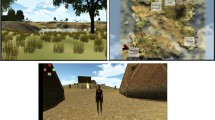Abstract
Pedagogical opportunities offered by 3D immersive environments are not restricted to subject-based knowledge but also include non-disciplinary and cross-curricular key skills. This pilot study introduced a large 3D scene of a non-extant architectural exhibition into teaching and learning activities at three UK schools. From observation and qualitative data capture, a comparative case study identified a number of pedagogical opportunities and challenges. Despite diverse teacher and student approaches, a number of common factors were identified including constructionist teaching methods and the suitability of 3D environments for developing cross-curricular key skills and capabilities. In relation to the literature, this paper analyses how subject-aligned use of the 3D model met with differing levels of success, identifies four key skills that emerged from student use of the model across all three schools, and considers how challenges might be translated into further learning opportunities.
Similar content being viewed by others
Notes
- 1.
Anonymized project outputs can be downloaded from http://research.gsofasimvis.com/revisit/.
References
British Empire Exhibition (1938). http://empireexhibition.com/
González, M.A., Santos, B.S.N., Vargas, A.R., Martín-Gutiérrez, J., Orihuela, A.R.: Virtual worlds. Opportunities and challenges in the 21st century. Procedia Comput. Sci. 25, 330–337 (2013)
Dalgarno, B., Lee, M.J.W.: What are the learning affordances of 3-D virtual environments? Br. J. Edu. Technol. 41(1), 10–32 (2010)
Mikropoulos, T.A., Natsis, A.: Educational virtual environments: a ten-year review of empirical research (1999–2009). Comput. Educ. 56, 769–780 (2011)
Bouta, H., Retalis, S., Paraskeva, F.: Utilising a collaborative macro-script to enhance student engagement: a mixed method study in a 3D virtual environment. Comput. Educ. 58(1), 501–517 (2012)
Dawley, L., Dede, C.: Situated learning in virtual worlds and immersive simulations. In: Spector, J.M., Merrill, M.D., Elen, J., Bishop, M.J. (eds.) Handbook of Research on Educational Communications and Technology, pp. 723–734. Springer, New York (2014)
Hunsinger, J., Krotoski, A.: Learning and Research in Virtual Worlds. Routledge, New York (2013)
Sandford, R., Williamson, B.: Games and Learning: A Handbook. Nesta Futurelab, Bristol (2005)
Hanghøj, T., Hautopp, H.: Teachers’ pedagogical approaches to teaching with minecraft. In: Connelly, T., Boyle, L. (eds.) Proceedings of the European Conference on Games Based Learning, Glasgow 2016, pp. 265–272 (2016)
Berns, A., Gonzalez-Pardo, A., Camacho, D.: Game-like language learning in 3-D virtual environments. Comput. Educ. 60(1), 210–220 (2013)
Shudayfat, E.A., Moldoveanu, F., Moldoveanu, A., Grâdinaru, A., Dascâlu, M.I.: 3D game-like virtual environment for chemistry learning. Sci. Bull. UPB 76(3) (2014)
Egenfeldt-Nielsen, S.: Beyond Edutainment: Exploring the Educational Potential of Computer Games (2011). Lulu.com
Tobias, S., Fletcher, J.D., Dai, D.Y., Wind, A.P.: Review of research on computer games. In: Tobias, S., Fletcher, J.D. (eds.) Computer games and instruction, pp. 127–221. Information Age Publishing, Charlotte (2011)
Keller, J.M.: Motivational Design for Learning and Performance: The ARCS Model Approach. Springer, London (2010). doi:10.1007/978-1-4419-1250-3
Lackovic, N., Crook, C., Cobb, S., Shalloe, S., D’Cruz, M.: Imagining technology-enhanced learning with heritage artefacts: teacher-perceived potential of 2D and 3D heritage site visualisations. Educ. Res. 57(3), 331–351 (2015)
Dede, C.: Developing a research agenda for educational games and simulations. In: Tobias, S., Fletcher, J.D. (eds.) Computer games and instruction, pp. 233–250. Information Age Publishing, Charlotte (2011)
Norton, L.: Using assessment to promote quality learning in higher education. In: Campbell, A., Norton, L. (eds.) Learning, Teaching and Assessing in Higher Education: Developing Reflective Practice, pp. 92–101. Learning Matters, Exeter (2007)
Ramsden, P.: Learning to teach in higher education. Routledge, London (2003)
Malone, T.W., Lepper, M.R.: Making learning fun: a taxonomy of intrinsic motivations for learning. Aptitude Learn. Instr. 3, 223–253 (1987)
Boydell, T.: Experiential Learning. Manchester Monographs 5, Manchester (1976)
Kirkley, J.R., Duffy, T.M., Kirkley, S.E., Kremer, D.L.H.: Implications of constructivism for the design and use of serious games. In: Tobias, S., Fletcher, J.D. (eds.) Computer games and instruction, pp. 371–394. Information Age Publishing, Charlotte (2011)
Acknowledgements
REVISIT and the British Empire Exhibition, 1938 project were funded by the Arts and Humanities Research Council, UK. Thanks to all of the schools, pupils, and teachers who participated in this pilot study.
Author information
Authors and Affiliations
Corresponding author
Editor information
Editors and Affiliations
Rights and permissions
Copyright information
© 2017 Springer International Publishing AG
About this paper
Cite this paper
Abbott, D., Jeffrey, S., Gouseti, A., Burden, K., Maxwell, M. (2017). Development of Cross-Curricular Key Skills Using a 3D Immersive Learning Environment in Schools. In: Beck, D., et al. Immersive Learning Research Network. iLRN 2017. Communications in Computer and Information Science, vol 725. Springer, Cham. https://doi.org/10.1007/978-3-319-60633-0_6
Download citation
DOI: https://doi.org/10.1007/978-3-319-60633-0_6
Published:
Publisher Name: Springer, Cham
Print ISBN: 978-3-319-60632-3
Online ISBN: 978-3-319-60633-0
eBook Packages: Computer ScienceComputer Science (R0)




